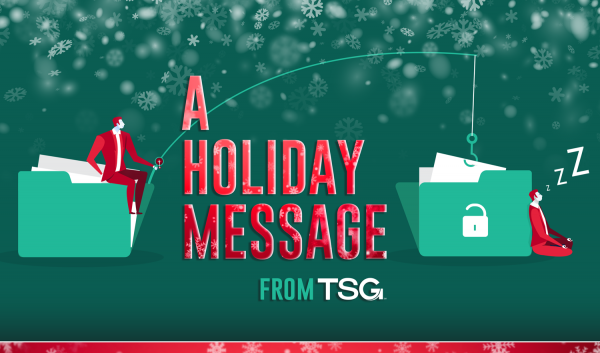Back to NewsHoliday Message from TSG!
Posted 11/30/21

The holiday season is a time for renewal and happiness. It is also, unfortunately, a time for a surge in phishing attacks and malware related scams. The effects of these attacks and scams can be devastating and can include loss of reputation or finances, loss of property, regulatory fines, and business costs.
Please raise your level of awareness and caution to guard against phishing attacks and malware scams by keeping in mind the following:
- Real estate or wire transfer scams – emails requesting information to transfer real estate title or finances.
- Social media account lockouts – often contain links with malware embedded.
- Bogus order or delivery confirmations – often contain fake order details and order status links which contain embedded malware.
- Financial account notifications – bogus emails from banks or investment firms requesting you to log in to view monthly statements so your credentials can be captured for use in accessing your finances.
- Refunds or prize notifications – these often contain requests for user details or embedded malware.
- Donation requests – these ask for your donations to aid victims of calamities or funding charities. They are often linked to the spammer’s bank account which makes you the victim.
- Legal scares – threats of immediate legal action where you are directed to respond with various information requests to avoid such action.
- Tech Support Scams – Pop-ups on your computer, an email, or a phone call that claims that malware or a virus has infected your computer. They may claim to be from Microsoft or Apple and tell you they can repair it for a fee. They will ask for remote access to your computer.
- Top authority or executive staff - emails which spoof a known email address and direct you to provide information or perform actions such as wire transfers.
- Trusted party scams – the sender acts as the victim’s acquaintance and requests you to open a malicious attachment or click on a malware infected address.
ALWAYS verify the sender email address as valid, be wary of emails with spelling errors or those from an unknown source, and never respond to an email from the government, law firm or law enforcement agency. Legitimate requests from these sources are made by verifiable means such as certified mail.
Please keep these recommendations in mind not only for the holidays but year around. They will certainly help you to protect yourself, your family and friends, and your employer.
Best Wishes for a Happy Holiday and Joyous New Year!
